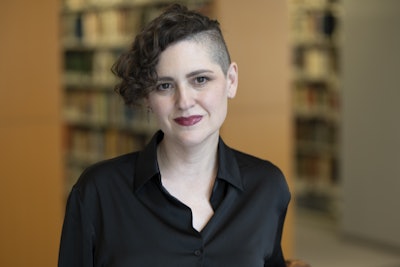 Dr. Laura Westengard
Dr. Laura Westengard
“We are in a moment that is very challenging for LGBTQ research,” she says. “CLAGS has really been a rock. It has persisted throughout the ebbs and flows. … At times, that entails more risk than at other times, and there is a sense that there’s a core value and purpose to CLAGS that is the rock on which people rest even when times are difficult.”
Westengard is the director of the Advanced Certificate in LGBTQ Studies at the Graduate Center, which was officially announced this March and will have its first cohort as of fall 2025. There are two options for applying. Students who are in a master’s or PhD program at the Graduate Center can apply to get the Advanced Certificate in conjunction with their other graduate work. In addition to that, students who want to apply to the Graduate Center just for the Advanced Certificate in LGBTQ Studies may do that.
“Students from the community, working in the professions, working as healthcare professionals or doing social work, for example, people in media, can apply to be matriculated into the Graduate Center and receive the Advanced Certificate as its own graduate degree,” she says.
LGBTQ Studies is a multidisciplinary scope, so graduate students from many disciplines as well as professionals and individuals from a wide range of areas are expressing interest. Westengard says this will bring diversity of interest and backgrounds into the Graduate Center where the courses will be offered.
“[LGBTQ Studies] explores queer histories, theories and cultures across multiple disciplines,” Westengard says. “It is important to have this program right now in a political climate that wants to demonize this kind of work because we’re creating space for thinkers to come together and have difficult conversations and think about making change. … We hope people come out of this being scholar activists.”
At City Tech, Westengard was involved in turning gender and sexuality studies into a minor, for which she served as coordinator, stepping aside this year to be the interim director of liberal arts and sciences. This being a technology-centered college, it has been meaningful to help faculty and students see how relevant the study of gender and sexuality can be to their other academic and professional interests.
“City Tech did not have academic minors, and in my search to further institutionalize the cluster of courses that were focused around gender and sexuality studies, I discovered this,” says Westengard. “I joined a committee to essentially create minors at the college. Gender and sexuality studies was our fi rst piloted minor for the creation of academic minors at the college. That took place beginning in the fall of 2021.”
Among her duties has been serving as the faculty advisor for the college’s PRIDE Club, which is both challenging and rewarding.
“Having a space means so much to student populations,” Westengard explains. “It is a beautiful thing that City Tech has a Pride lounge and a student Pride club. City Tech has an LGBTQIA+ collective, that’s a college-wide committee of faculty, staff and students that are working to enhance and support the LGBTQ community on campus. We apply for and receive funds as part of the CUNY-wide LGBTQ consortium, which is a group of CUNY campuses that receive some funding from the City Council to do this work of developing a campus presence and educational programming initiatives around LGBTQ issues, culture, etc.”
These funds enabled the creation of the lounge, which provides students with a sense of belonging and community. Something that has struck her about teaching within CUNY is that diversity is in the DNA of both City Tech and CUNY broadly.
“It brings together faculty, staff, students, the whole community of people from so many different perspectives, experiences, cultures and interests, and that includes research and teaching interests,” Westengard says. “An environment that respects and cares for the souls of our students is exactly something that fuels me, not just them.”















